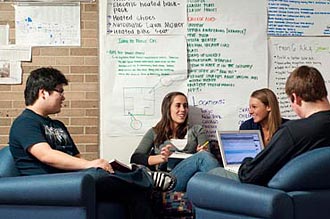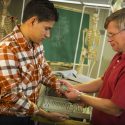Learning community teaches spirit of entrepreneurship
In high school, computer programmer Tim McGowan enrolled in advanced-placement Latin. When it came time to study for the big exam, he was ready to admit that languages weren’t his thing.

Students (left to right) Jay Jung, Mallory Filko, Alonna Atterbury and Nick Fritz study in the student lounge of the Entrepreneurial Residential Learning Community (ERLC) located on the second floor of Sellery Hall on Nov. 17, 2009. The ERLC is designed to teach students the entrepreneurial process through an environment that focuses on creativity and innovation.
Photo: Bryce Richter
Desperate for a more effective way to study, McGowan turned to his computer and created a virtual-flashcards application.
It’s this kind of ingenuity that sets the young residents of the Entrepreneurial Residential Learning Community (ELRC) apart from their classmates. Now in its second year on campus, the ERLC is home to 65 creative UW–Madison students who live on their own floor in Sellery Hall.
“The real goal is fostering the entrepreneurial student, and that’s a student who’s entrepreneurial in his or her whole life,” says ERLC faculty director Anne Miner, Ford Motor Company Distinguished Professor of Management and Human Resources and director of the cross-campus Initiative for Studies in Transformational Entrepreneurship.
McGowan, currently a UW–Madison sophomore studying electrical engineering, tweaked his program, Glue, during the next few years.
McGowan was one of the first two fall 2009 ERLC residents to receive funding from the learning community’s Dream Big Fund for his venture. He plans to use the money for marketing and promotion.
“It’s really fun to come up with an idea, to work on it, see it to fruition,” he says. “It’s trying to figure out what people want and how to get the product to them in a way they want it.”
The entrepreneurial spirit might involve pioneering an independent research project for class, starting a new student organization or founding a company or not-for-profit venture. In all of them, Miner observes, the entrepreneurial process entails “imagining and seeing opportunities that others don’t, but beyond that, also taking action.”
ERLC students are encouraged to register for a three-credit fall seminar, “Entrepreneurship in Business, the Arts and Nonprofits,” which is taught by Miner and reserved exclusively for ERLC residents.
The course looks critically at the process and impact of entrepreneurship and brings in guest speakers from a range of disciplines.
This spring, ERLC students will be able to register for a one-credit seminar taught by ERLC co-program coordinator and School of Business faculty associate John Surdyk on social entrepreneurship.
This year, 50 of the 65 residents enrolled in Miner’s course.
One of the biggest benefits of the course, which is taught in Sellery, is that the students can continue to talk about the concepts outside of the few hours they’re actually in the classroom. This, in turn, enhances the community feel of the learning residence.
“The students actually learn quite a bit from one another as well as what they’re taking away from the class,” Surdyk says. “They find they have a lot more to share with each other and learn from one another, and I think that actually contributes to the energy on the floor.”
The sense of camaraderie on the floor is unusual not only because of the residential learning community model, but also because of the common interest that unites the diverse personalities on the floor.
“I think there’s a unique thing that happens when you’re living and learning together,” says Sellery Hall area coordinator and ERLC co-program director Jim Franzone. “It provides a more intense experience, a more unified experience.”
ERLC house fellow and UW–Madison junior Ben Beduhn was blown away with the quality of community life on the floor.
“I can almost say with 100 percent confidence level that my students are by far the most outgoing, the loudest, the most rambunctious students at the university,” he says. “I love them to death.”
ERLC freshman Rebekah Winiarski is also enjoying her peers. “I think we have such a good mix of people,” she says. “We have such a diverse floor with many different cultures and backgrounds, so it’s really cool getting to know them. I’ve never been opened up to that before.”
The diversity extends from students from different cultures, to various interests, personalities and future plans. There are students interested in starting for-profit ventures and nonprofits, and others who are just there to absorb the experience and apply their skills later on.
In addition to being able to consult with influential university faculty and apply to the Dream Big Fund, the ERLC, which was founded as part of a Kauffman Foundation grant administered by the Office of Corporate Relations, uses program fees, housing and Business School subsidies to provide its students with other valuable opportunities.
ERLC students take field trips to tour local startups or go out to dinner as a community and commission the restaurant owners to speak to the group about how they got started.
The ERLC hosts monthly dinners with guest speakers including entrepreneurs, pioneers of university initiatives, research faculty and student entrepreneurs.
Parts of the cross-campus Burrill Business Plan Competition are held in Sellery Hall, and the Wiscontrepreneur 100-Hour Challenge takes place in the basement.
Though some students become successful entrepreneurs during their stay in the ERLC, it’s likely that results of their experience in the learning community may be greatest later in their college careers, or even later in life.
“There will be a success story out of this floor,” McGowan says. “There’s too much talent, too much drive for there not to be.”



